The Metamorphosis is a short story written by Franz Kafka, which was first published in 1915. One of his best-known works, it tells a story about a man called Gregor Samsa and his peculiar transformation. He and his family have to deal with the consequences of this metamorphosis.
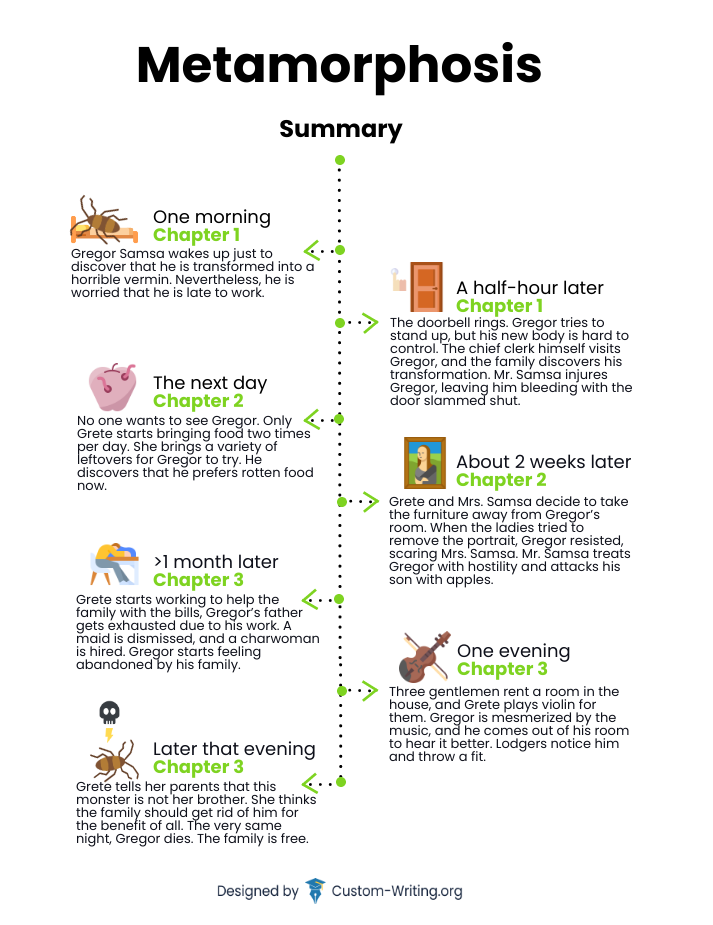
The Metamorphosis Summary
The Metamorphosis story starts with Gregor, who is a traveling salesman, waking up late for work. He tries to get up from his bed, but he cannot do it for some unknown reason. There is no explanation of why this happened to the protagonist, but he finds himself turned into a vermin overnight. He decides to sleep a little longer to avoid the problem, hoping that it will disappear. However, he cannot do so.
Even in this horrendous situation, all he can think about is his career, which he cannot help but hate due to the need to travel constantly. The reader can assume that Gregor is a workaholic, but a little further down, he explains that he does so for his parents and their well-being. He looks at the clock and realizes that he is late. Gregor starts imagining that his boss will be outraged by Gregor’s delayed appearance. The reader also learns that Gregor never took one single day off in many years. Therefore, he is afraid that taking one will look suspicious.
A quarter to seven, when the clock strikes, his mother asks him if he is going to work. He tries to reply, but he cannot recognize his own voice. The realization that he is still at home makes other members of his family try to enter his room and see why he missed work. His sister, Grete, is the one who is the most preoccupied.
Gregor battles with his new body, when the chief clerk visits him to see why he did not use an early train to come to work. Gregor tries to explain that he was not feeling well. However, his speech cannot be understood by others. Instead of sympathizing with the person who does not feel well, the chief clerk decides to accuse him of stealing money from the company. Gregor thinks that he can save the situation by opening the door. He still does not understand the implications of what it means to be a giant bug. When Gregor’s family manages to open the door, they are terrified by what they see.
The second part of The Metamorphosis story starts with Gregor waking up from a deep sleep. He stands up and sees the food that has been brought to him by his sister. Gregor wants to eat, but the smell of food makes him dizzy. A little bit later, Grete brings another tray with rotten food that looks more appealing, so he devours it.
The reader learns that some time has passed. Gregor’s sister is the only member of his family who truly cares for him in his transformed form, so she becomes a sort of authority in the family. She even behaves friendly with him, yet she cannot look at him out of disgust. However, it changes later in the story as she becomes an antagonist at the end. Grete is the only other character in the story addressed by her name.
The reader gets to understand why Gregor works so hard. He is the only person who supports the family. It’s been like that for at least five years. Gregor wonders who will bring bread to the table when he is unable to do so. His father is old and sick, his mother is frail, and his younger sister has never worked a day. The thought of money is more distressing to Gregor than his appearance. He cares for the members of his family and especially for Grete.
In the middle of the story, Gregor learns how to appreciate being a beetle. He starts crawling on the walls and the ceiling, swinging upside down. His sister decides to move the furniture out of his room to help him crawl around. At first, this thought makes him happy, but his mother’s comment about how familiar objects remind him about his humanity distresses him. The Metamorphosis’ meaning relies heavily on Gregor being torn between his bug and human sides. He strives to protect the picture on the wall and crawls from underneath the sofa, not hiding anymore. This scares his mother so much that she loses consciousness, which angers both Grete and the father.
It is the moment when the transformations that happen to Gregor’s family members become apparent. Gregor’s sister turned into an active and helpful young woman. His mother found a job as a seamstress and looks more engaged. Finally, his father goes back to work and regains his strength and authority. When Gregor sees him, at the end of the second chapter, he cannot believe his eyes. When Mr. Samsa attacks his son with apples and desires to murder him, Gregor is as terrified as ever. Suffering from the damages in his room, the protagonist understands that they have become independent of his constant protection.
Nevertheless, the third chapter reveals that the family has significant financial losses and tries to make ends meet. As Gregor’s sister does not want to take care of him and his room any longer, they have to hire a new maid to replace the resigned one. They employ one woman who is not at all afraid of the protagonist’s appearance. She is obviously a cheaper maid because they call her a “charwoman.” Finally, they lease the room to three lodgers.
One evening, Grete decides to play the violin for the first time since Gregor’s transformation. The lodgers hear it and welcome the music into the living room, allowing Gregor to listen. He is astonished by the sounds, feeling more human than ever since the metamorphosis, and crawls into the room where everyone is sitting. At first, the guests and the family did not notice the beetle. Having seen it, the lodgers are interested in him at first but later disgusted. They want to leave the house immediately because of unsanitary conditions, trying to make it an excuse not to pay their bills. The family and even Grete are upset with Gregor, deciding that their son and brother is gone forever as Gregor would not do something like this. They explicitly want to get rid of him.
The next morning, when the maid comes to the room, she finds Gregor dead. As the maid disperses the body, the family chases away the lodgers and decides to take a break, leaving the house. They are not mourning Gregor’s death; instead, they feel as if a huge weight has lifted.
The Metamorphosis Analysis
Many literary critics have discussed the meaning of The Metamorphosis from different perspectives. Nevertheless, almost all of them agree that the story is about coming to terms with a situation. A man has turned into a beetle, vermin. The German word that Kafka used to describe the creature is “ungeziefer.” It means an unclean animal that you do not want to touch.
The Metamorphosis meaning of the work as a whole can be explained through one of its central themes, alienation. The main character of the story is alienated from his family, society, and even his human body. At the beginning of the story, Samsa’s family members experience alienation as well. They live a parasitic type of life and entirely depend on Gregor. Once he undergoes a transformation, the rest of the characters get transformed too. They can find jobs and provide for themselves. However, they do not want to care for Gregor.
The story’s setting is limited to Gregor’s apartment, primarily within Gregor’s room in The Metamorphosis, which makes it claustrophobic. Only in the end, after Gregor’s death, the family can break free from the apartment and start “living.” The outside world is represented by the people who work in the house, the Chief Clerk, and the lodgers. Gregor’s memories of the past also embody it.
The major conflict in the short story is Gregor’s transformation into a bug. It creates problems for Gregor as he tries to reconcile his humanity with this transformation. When the plot starts, his body has already turned into a beetle. Throughout the story, the readers learn that it is not only the body that gets transformed: his thoughts, feelings, preferences as well. Though his human side never entirely disappeared.
Nevertheless, Gregor does not complain about his challenging situation. Yet, it makes the people around him lose their humanity and empathy. His family’s attitude towards him changes. For instance, Gregor’s sister shifts from friendly to indifferent, and his father is hostile. It is evident in the third part of the story when Gregor comes to listen to Grete’s violin. This is the climax of the story because it demonstrates a betrayal by the sister, his closest friend and family member.
The protagonist cared for his family. When he could not care for himself any longer, he was left alone. Gregor is a human trapped in the insect body, while his family members are insects in the human form. They do not feel love for Gregor as they injure and hurt him. A lack of human attachment is another vital theme in the story.
Thank’s for reading the summary and analysis of The Metamorphosis. You can check the essay topics and samples to explore the novella more.
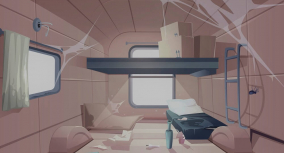
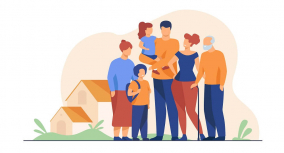
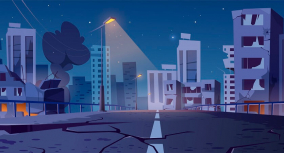
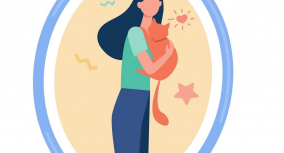


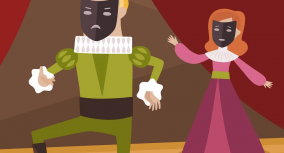

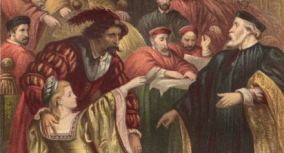



I believe Gregor is a symbol of Jesus Christ, his suffering, death, and the trans-formative power of his resurrection. Gregor isn’t the only one who makes the metamorphosis, it is the members of his family who are truly the dynamic characters, Gregor is just the catalyst.